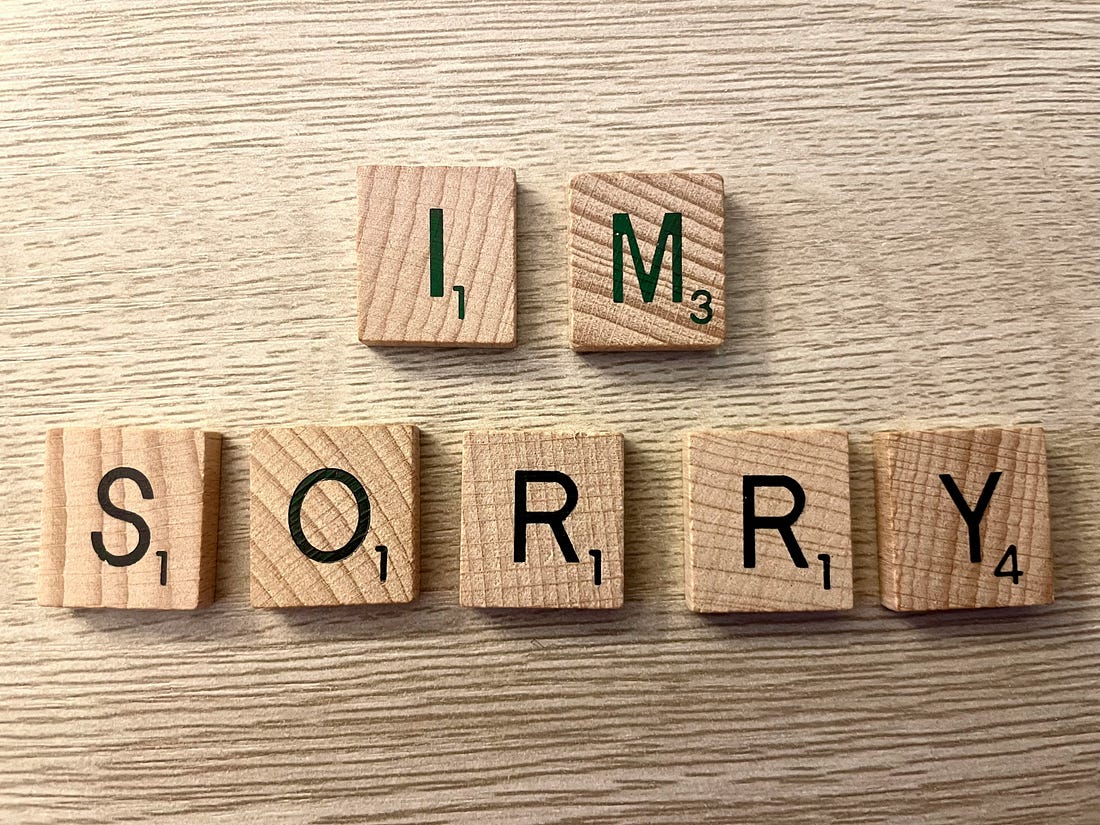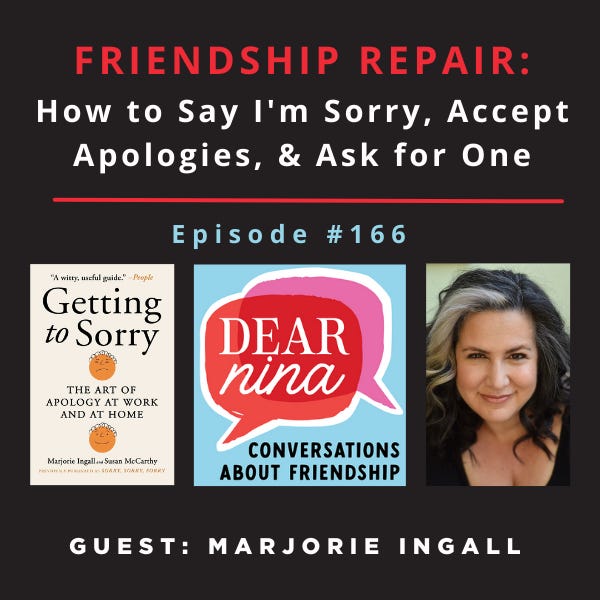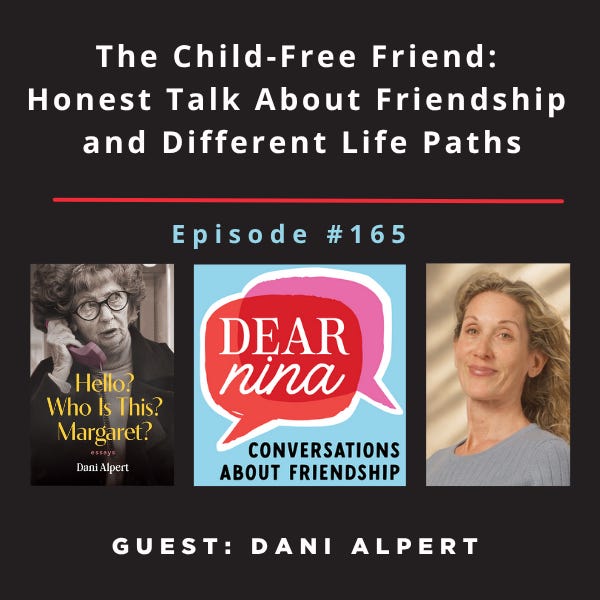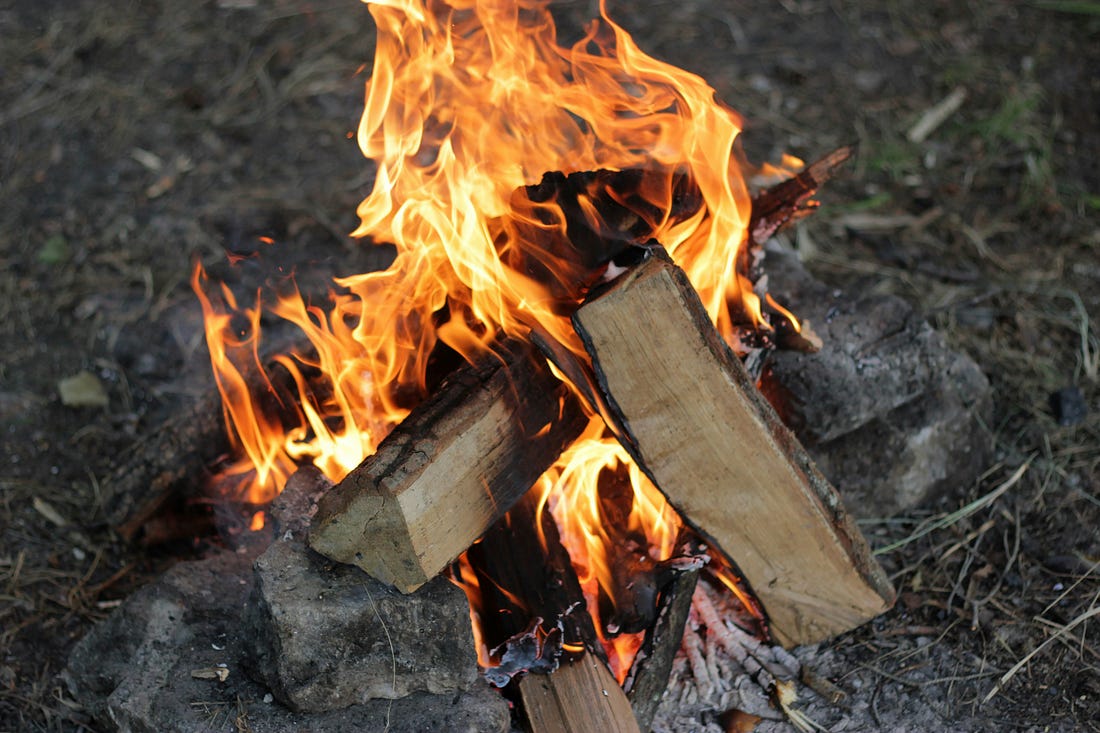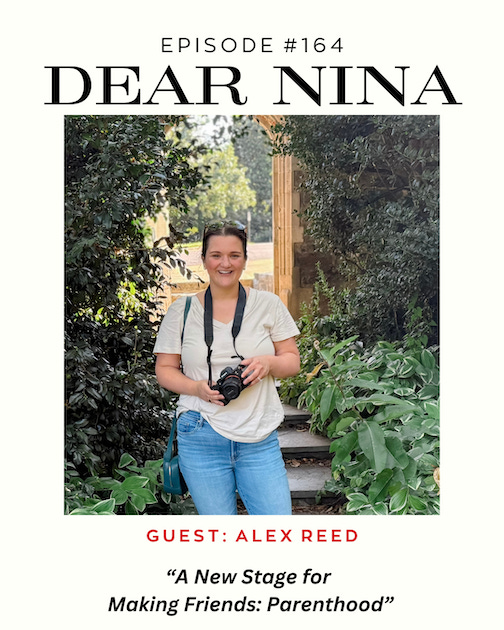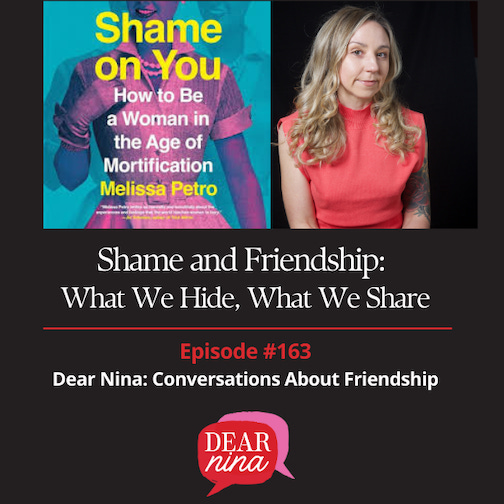Good Apologies Will Save Your FriendshipsTo the friends who can endure hard conversations (and also forgive!)
Apologies are difficult and important work. They’re not “light friendship maintenance” like remembering a friend’s birthday or forwarding a funny meme. And here’s what I’ve come to believe in a decade of writing about friendship:
I covered all three areas of apologies in episode #166 of Dear Nina with the wise and wonderful Marjorie Ingall, co-author with Susan McCarthy of Sorry, Sorry, Sorry: The Case for Good Apologies (released in paperback as Getting to Sorry: The Art of Apology at Work and at Home) and co-creator of SorryWatch.com. We covered Marjorie and Susan’s six steps of a good apology, different scenarios of granting forgiveness (or not), what to do when you feel someone owes you an apology, and how to handle an apology that was subpar. None of this is easy, but the harder the conversation, the deeper the friendship on the other side. Why is saying “I’m sorry” in a way that doesn’t make excuses and truly acknowledges wrongdoing so difficult?A good apology forces us to admit we’re flawed. Likewise, granting forgiveness or soliciting an apology forces us to admit someone else has the power to hurt us. Yet those conversations are exactly the type that bring friends closer. One of my favorite moments in my conversation with Marjorie was when she said:
For the six steps to a quality apology and some good laughs and personal anecdotes about apologies gone wrong (and right), listen to Majorie in episode #166.
FIND EPISODE #166 on Apple, Spotify, YouTube, and anywhere you listen to podcasts! The Child-Free Friend: Honest Talk About Friendship and Different Life PathsLast week I spoke with bestselling author Dani Alpert, who has always known she didn’t want children. While her best friends all married and had kids, Dani carved out a different life. The result? Decades of navigating friendships where communication was extra necessary to keep resentment and misunderstanding at bay. Dani says it took a lot work along with the type of hard conversations I referred to in my episode with Marjorie as well, but she did not want to lose these important relationships and every difficult discussion was worth the effort. Dani has advice for listeners that goes beyond whether or not you have kids. Many areas of life and the decisions we make can set us apart from the path our friends chose. No matter the “topic,” communication is key. There’s no other way to hold onto the friendships that matter to you. Whatever the difference is between you and your friends, Dani’s wisdom applies: speak up, be honest, and trust that the right friends will stick. Listen to episode #165 with Dani for a funny, candid, and deeply relatable episode about friendship across different life paths.
FIND EPISODE #165 on Apple, Spotify, YouTube, and anywhere you listen to podcasts! Two anonymous questions you might have missedLet’s connect outside of this newsletter: You can find me most often in the Facebook group, Dear Nina: The Group. All the social media links are below. I know I need to get rid of some them! Instagram | TikTok | YouTube | LinkedIn | My Website You’re a free subscriber to Dear Nina: Conversations About Friendship. Frustrated with some of your friends? You’re not alone! The anonymous letters are a perk for paying subscribers. You probably have a similar question. Upgrade any time for the full archive. |
Whether your audience wants to learn how to run a business or simply advance in their career, they will always turn to specialized business blogs for advice.
Monday, 29 September 2025
Good Apologies Will Save Your Friendships
Thursday, 18 September 2025
Bonfires vs Tents in Friendship
Bonfires vs Tents in FriendshipPlus: Shame and friendship: What we hide vs. what we share.
When Alex Reed of Roses & Radicchio spoke in episode #164 about the earliest months of new motherhood, she said it was like being “deep in the forest.” Since my kids are 21, 18, 16, 13, it’s been a long time since I thought about those first months, but her imagery rang true for me. Alex continued the metaphor, explaining some parents “build a bonfire” while others “pitch a tent.” As she said more, I knew I’d been a bonfire mom. Alex was (is!) too. We both sought to build support and community around us because we felt we needed it. Frustrated with some of your friends? You’re not alone. Check out the anonymous friendship dilemmas. You might have a similar question.
This is true for friendship at EVERY stage of life! Not just new motherhood.There’s not a right or wrong way—but there are different approaches.
Alex was referring to that uncomfortable feeling of rejection or judgement when you’re in making new friends mode, but you bump up against people who are not open. You might be meeting someone who was open to a bonfire at one point, but they’re in tent mode now. Perhaps they’re managing a health issue, aging parents, a financial problem, or they’ve worked hard to develop friendships and they cannot manage one more relationship in this season of life. Alex and I spoke about looking for “fellow travelers” in the forest who are open to your approach—bonfire or tent. Both are valid. Both help you make it through the night. The problems begin when we insist everyone else use our method. The bonfire people are the ones who should make a point to join classes, reach out to fellow daycare parents, be brave and ask the woman from the library book hour who seemed nice if she’d like to grab coffee or walk next time. There are others open to the bonfire. Keep looking! A reminder for when you encounter a tent person:A tent person perhaps already had an inner ring, nearby parents, siblings or cousins, neighbors she likes, an established faith community. She might not feel open for more right now. That’s not a snub. That’s a full plate. Don’t write this person off forever or take it too personally when she doesn’t want to join your weekly stroller walks. Honestly, I could go on and on with this metaphor, but it’s really Alex’s so I will merely urge you to listen to Alex on episode #164 if you’re looking for new mom friends, or really new friends at any stage of life. This episode is applicable to so many of the letters I receive. Find Alex on Instagram too.
Shame & Friendship: What We Hide vs. What We ShareWhat happens when we carry shame into our friendships? How does it keep us apart? How does it connect us deeply to others? In episode #163, I spoke with author Melissa Petro, whose book, SHAME ON YOU: How to Be a Woman in the Age of Mortification, delves into the complex relationship between shame, identity, and connecting with friends. Together we explore how unacknowledged shame affects our ability to form deep, meaningful relationships. HIGHLIGHTS:
Two anonymous questions you might have missed
Let’s connect outside of this newsletter: You can find me most often in the Facebook group, Dear Nina: The Group. All the social media links are below. I know I need to get rid of some them! Instagram | TikTok | YouTube | LinkedIn | My Website You’re a free subscriber to Dear Nina: Conversations About Friendship. Frustrated with some of your friends? You’re not alone! The anonymous letters are a perk for paying subscribers. You probably have a similar question. Upgrade any time for the full archive. © 2025 Nina Badzin |
Another Layer in the Exclusion Conversation
On power, effort, and the friendships we want but haven’t built ͏ ͏ ͏ ͏ ͏ ͏ ͏ ͏ ͏ ͏ ͏ ...
-
Sheri K posted: " #*insert person/company name*isoverparty or #*insert person/company name*iscancelled How often do you ...
-
Lit Hub Excerpts posted: " I went to work and a guy I wait on said he was leaving. He said everyone he knew was pu...

